Mirror celebrates 125 years of student news
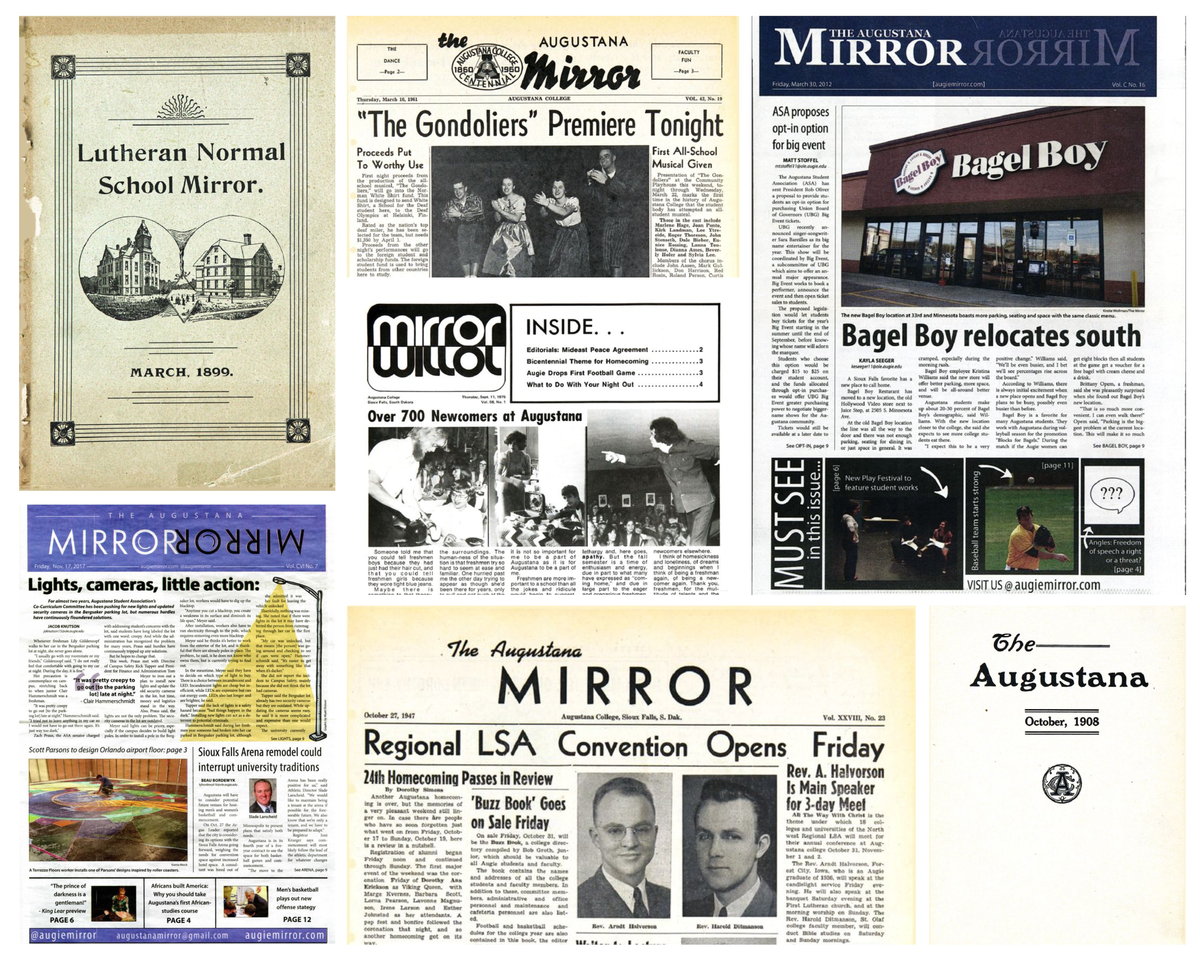
The Mirror wrote and published its first words in March 1899 at the Lutheran Normal School.
“Her kommer jeg!” its introduction read, which translates to “Here I come!” in English.
Rev. Amund Mikkelsen, the eighth president of the Lutheran Normal School, wrote those first words — in Norwegian and from the perspective of the publication.
Mikkelsen went on to write that the publication should be a mirror, informing people of the operation of the Lutheran Normal School and its teachings, livelihood and productions.
Now, 125 years later and known now as the Augustana Mirror, the publication continues to provide the campus community with news and information relevant to the institution and its student body.
The first issue of the Lutheran Normal School Mirror included sections such as art, literature, personal, editorial and local. Stories ranged from information on upcoming events to students’ opinion essays, with topics spanning from the difficulty of exams to the importance of reading Shakespeare.
Students edited the paper, and each monthly issue was to contain “a contribution from some friend of the school” on topics pertaining to teaching or those of general interest.
In 1908, Augustana College in Canton, South Dakota, established a publication it called “The Augustana.” When Augustana College moved to Sioux Falls in 1918 to merge with the Lutheran Normal School, the Mirror won out.
“When the merger happened with the two schools in 1918, it happened in a very chaotic way that there was actually a pause in the newspaper for a period of time,” Liz Cisar, collections assistant, said.
By 1920, the paper was up and running again.
“So obviously Augustana had this paper under a totally different name, Lutheran Normal School had the Mirror and they came together, rebooted and called it the Mirror,” Cisar said.
Over more than 100 years, the Mirror has seen dozens of student editor-in-chiefs. In recent decades, editors have been responsible for overseeing the production of the publication and ensuring it follows journalistic and design principles, in addition to informing the student body of newsworthy issues at Augustana.
Mary (McConahie) Toso, ‘90
Editor-in-chief 1989-90
What were your roles on the Mirror?
I think I started writing my sophomore year, and then I was an entertainment editor my junior year and then I edited my senior year.
What is your favorite memory of being on the Mirror?
We would be up until two or three in the morning, and we paid a student — just a random student, not even anyone on the staff — to get up in the middle of the night and come pick up our baby and deliver it to Dell Rapids to the printer on a Tuesday night because our print day was Wednesday.
Did any big changes occur during your time on the Mirror?
My junior year, so the year before I was the editor, we got a Macintosh computer. It was big, big news. It just revolutionized what we were able to do and the amount of time that it took us to do it, so it was simply amazing.
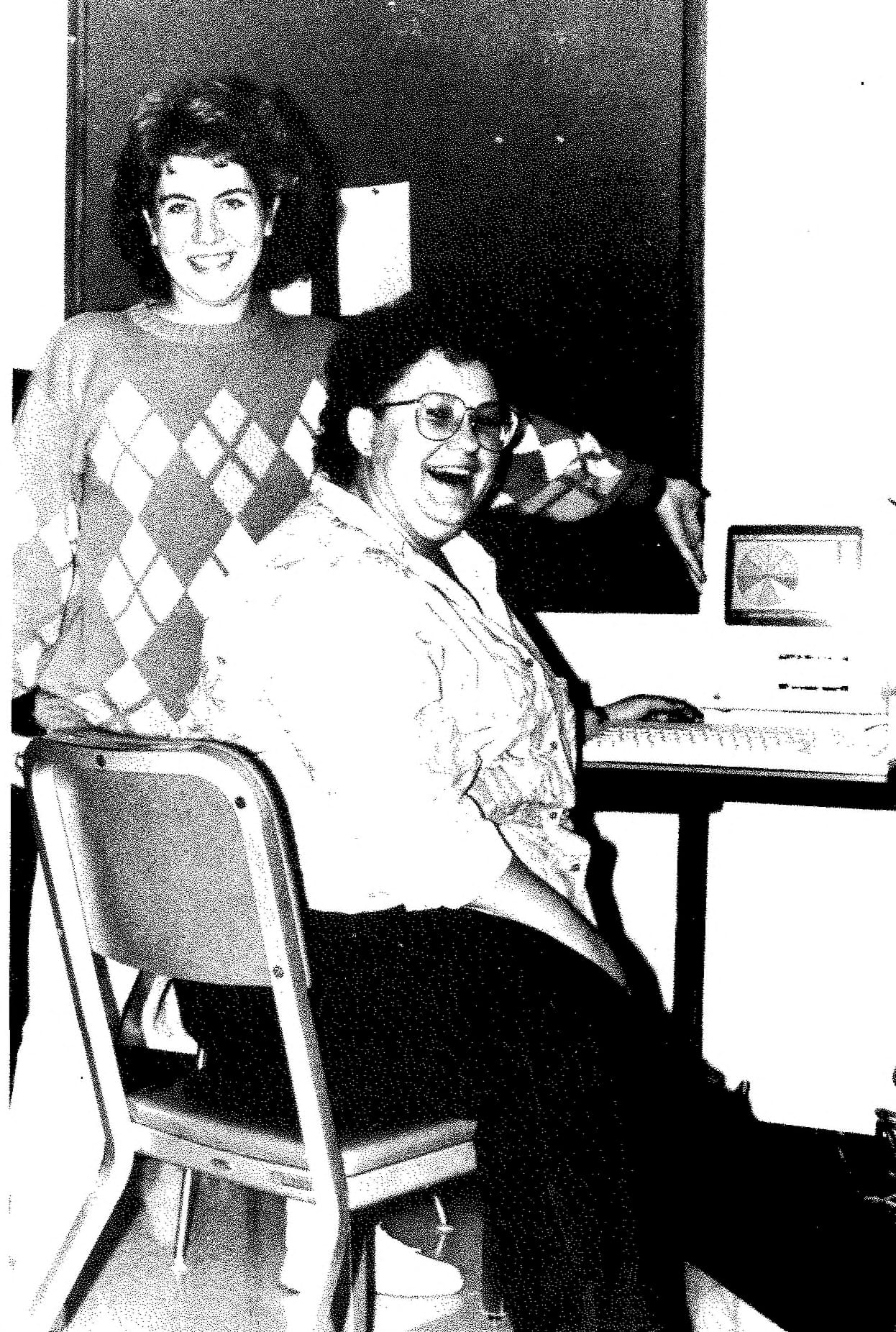
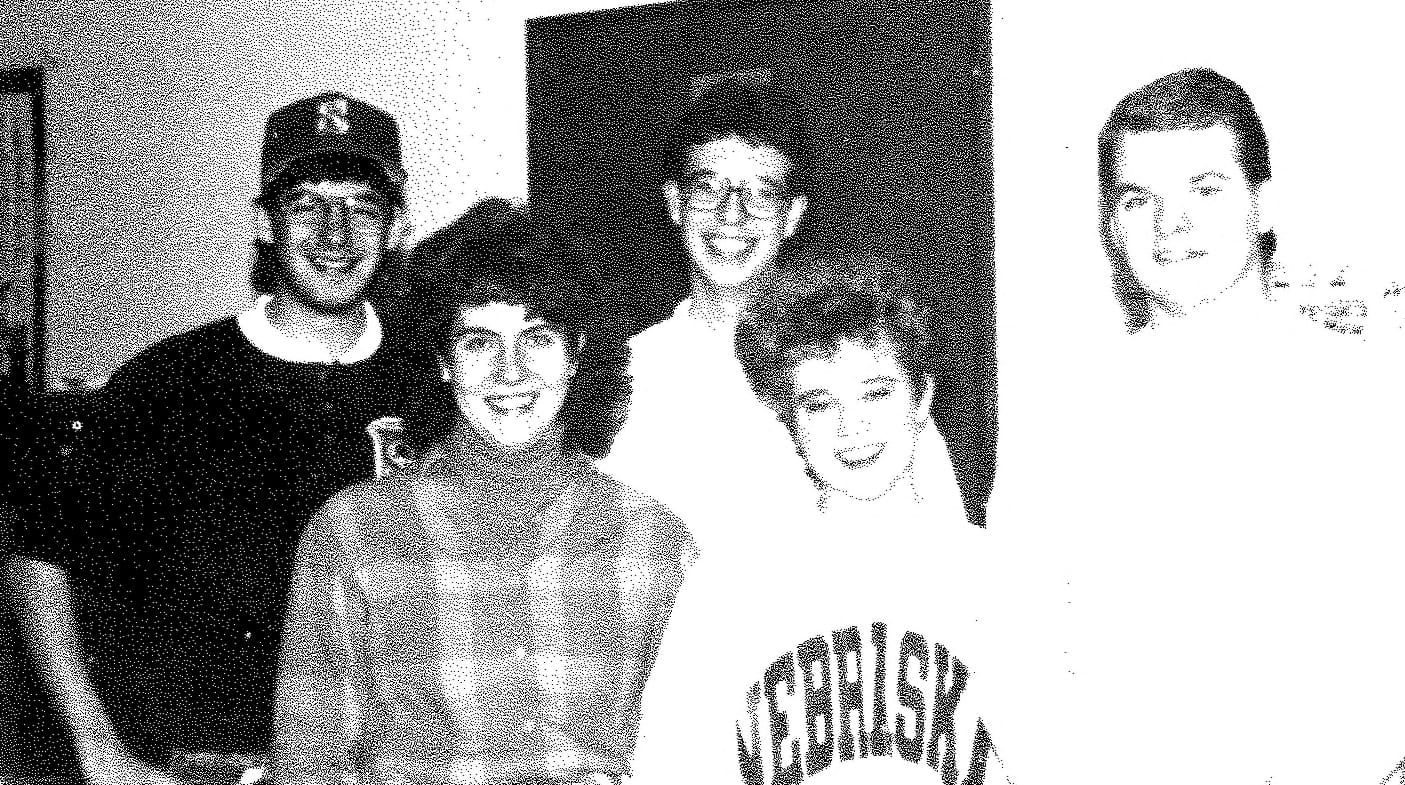
(Left) Mary (McConahie) Toso and former Editor-in-Chief Alica Thiele show off the Macintosh computer in the Mirror office during Toso's junior year. (Right) Mary (McConahie) Toso, front left, poses with her fellow Mirror staff in spring 1989. Photos courtesy of the EDDA.
What is the importance of student journalism today?
I think having a student newspaper builds community on our campus. I think it helps faculty and staff have a glimpse into things that are important to students, that students are talking about, trends, ideas, the way that you all think about things, the topics that you choose to debate in your pro and con columns. I think it's just good insight for those of us who work at the university as to what is on all of your minds.
What does it mean to you to have been a part of a publication that is now 125 years old?
I love that we haven't messed with the Mirror, you know? I mean, it's not something that we've tried to change the name of. It has been steadfast. It has been reliable.
Also, I just know how important the Mirror has been to people throughout all of the years. I mean all of the alums that I would talk to if they graduated in the ‘50s or the ‘60s or whatever, some of those alums at their 50th class reunion would produce Mirrors. They would come with their Mirrors to share stories or to remember things that had happened while they were students at Augustana, so yeah, it is history for sure.
What are you up to now?
I came over to the Student Success Center in 2016. Now I'm the director of the Student Success Center, and I work with an amazing team of professional staff who help students in their academic and career pursuits. We offer academic advising and career counseling for our students to help them achieve their goals and live out their vocation.
Katie (Knutson) Foutz, ‘00
Editor-in-chief 1999-2000
What were your roles on the Mirror?
I worked on the Mirror all four years as a reporter and assistant and then [variety] section editor.
What did a typical publication night look like for you?
We laid it out on Mac computers on QuarkXPress, that was the publishing software. The writers turned in their stories on floppy disks, which were not floppy at that time. They were hard plastic things, but we still called them floppy disks due to their legacy. And then we printed those out because we had to [put them on] an 11 by 14 sheet that also had the ads on it… We had to use hot wax, so when it was really deadline time, the room would smell like hot wax, and we’d roll out the pieces of paper on hot wax to apply them to the sheet that went to the printer.
What is one of your favorite memories from your time on the Mirror?
The Mirror newsroom was really where I had my first experiences with covering government, administration, budgets, things like that, that led to what I did regularly on the politics beat as a news reporter. It was the first place I learned to actually work on deadline and got to see my name in a byline. I had my first experience at a professional conference because we went to the national college journalist conference.
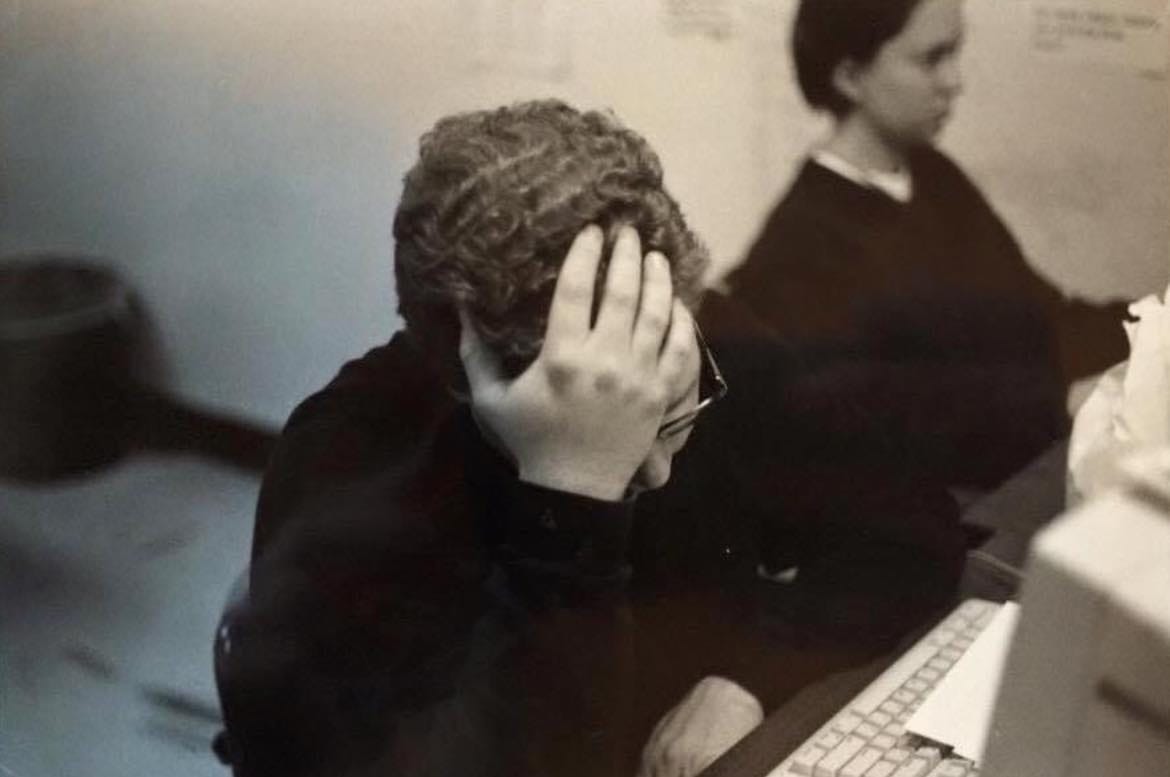
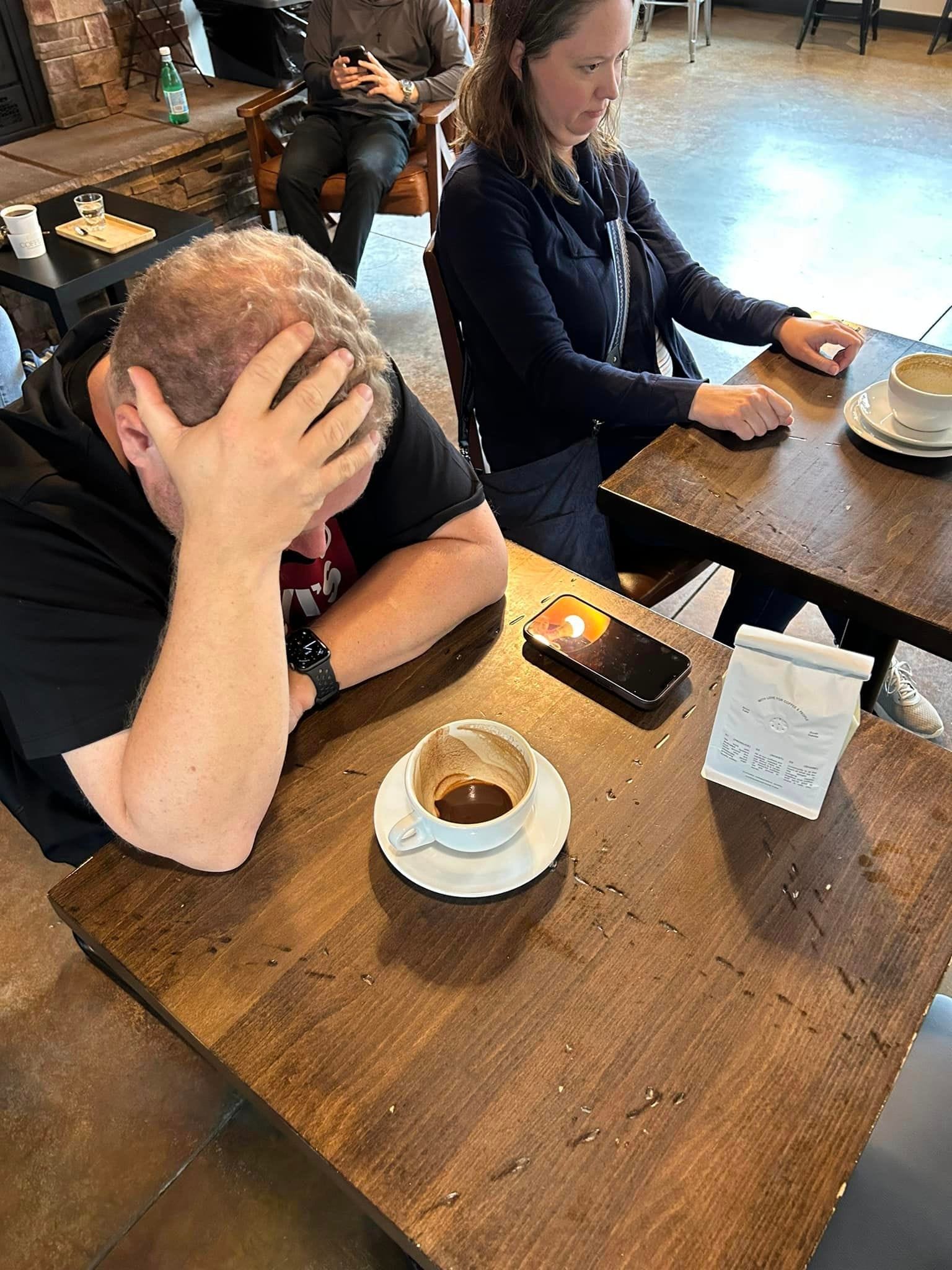
(Left) Eigil Ramstad, forum editor, and Katie (Knutson) Foutz, variety editor, work at the computers on a Mirror press night. (Right) Eigil Ramstad and Katie Foutz recreate their photo in the Mirror office at Coffea in 2023. Photos submitted by Katie Foutz.
Do you have a favorite story you wrote?
I wrote a profile of one of my classmates who was a Barbie doll collector and in college, so I thought that was novel. I asked her about it. She knew so much about them, and she was like, “I get the Christmas one. Every year, there’s a new Christmas release.” She just had a lot of them lined up in her dorm room. It was very pink, very pretty, and she was just very much a girly girl about it, and I loved it and I got to write about it for the Mirror.
What was your most memorable interview?
I would say my most memorable interview was with Archbishop Desmond Tutu, who was a Nobel Peace Prize winner who came to Augie for the Boe Forum. The editors always got that assignment, the Boe Forum speaker, so I was the first media person to actually greet him once he touched down in Sioux Falls. I met him at the airport and got to ride with him from the airport to the hotel. I got to interview him one-on-one there, which was pretty awesome.
What are you up to now?
[Sanford Health News] is an online publication that puts out the stories about Sanford Health. So at Sanford Health News, we have reporters who go out and interview sources and write the stories. I’m the editor of Sanford Health News, so I see the stories from beginning to end. I coach the writers, I copy edit the stories, I write the headlines, I put them on the web, and keep the website humming and search engine optimized.
Marcella Prokop, ‘05
Co-editor-in-chief 2003-2004
What were your roles on the Mirror?
I started at Augie in 2001. I was assistant editor, not immediately, but pretty soon that fall semester. And then, because journalism was my major, I knew that I was going to be part of the Mirror every semester. My junior year, Michael Goodwin and I were co-editors.
What is your favorite memory of your time on the Mirror?
My favorite memory of being part of the Mirror was just the camaraderie that I had with all of the other writers and editors. The Mirror people were my people.
I work in higher education today. I sometimes adjunct at Augie, and when I talk to people about trying to find their fit in college, I always tell them that they need to find their people. I felt really lucky that I just walked into this crew of really diverse, curious, interesting people.
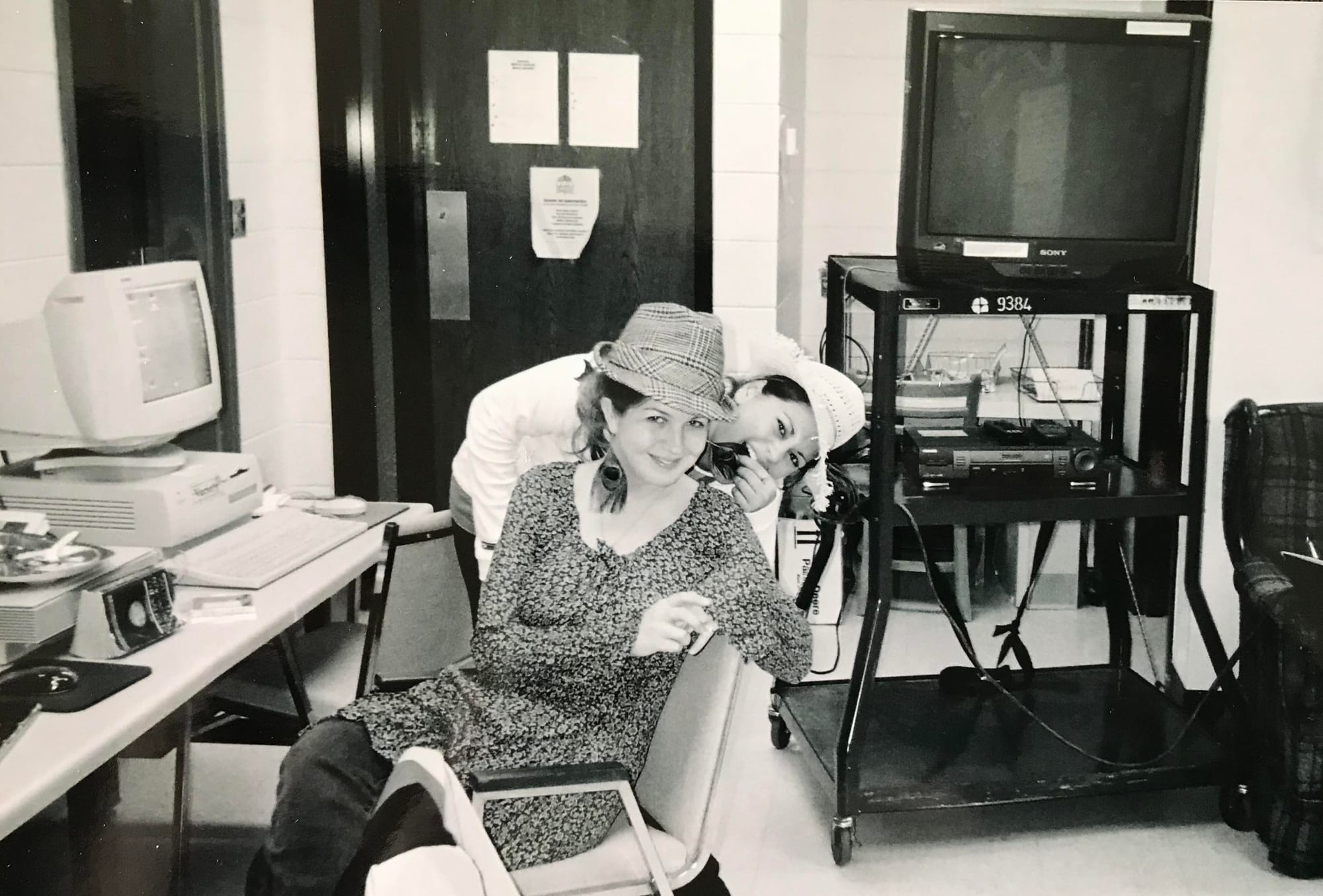
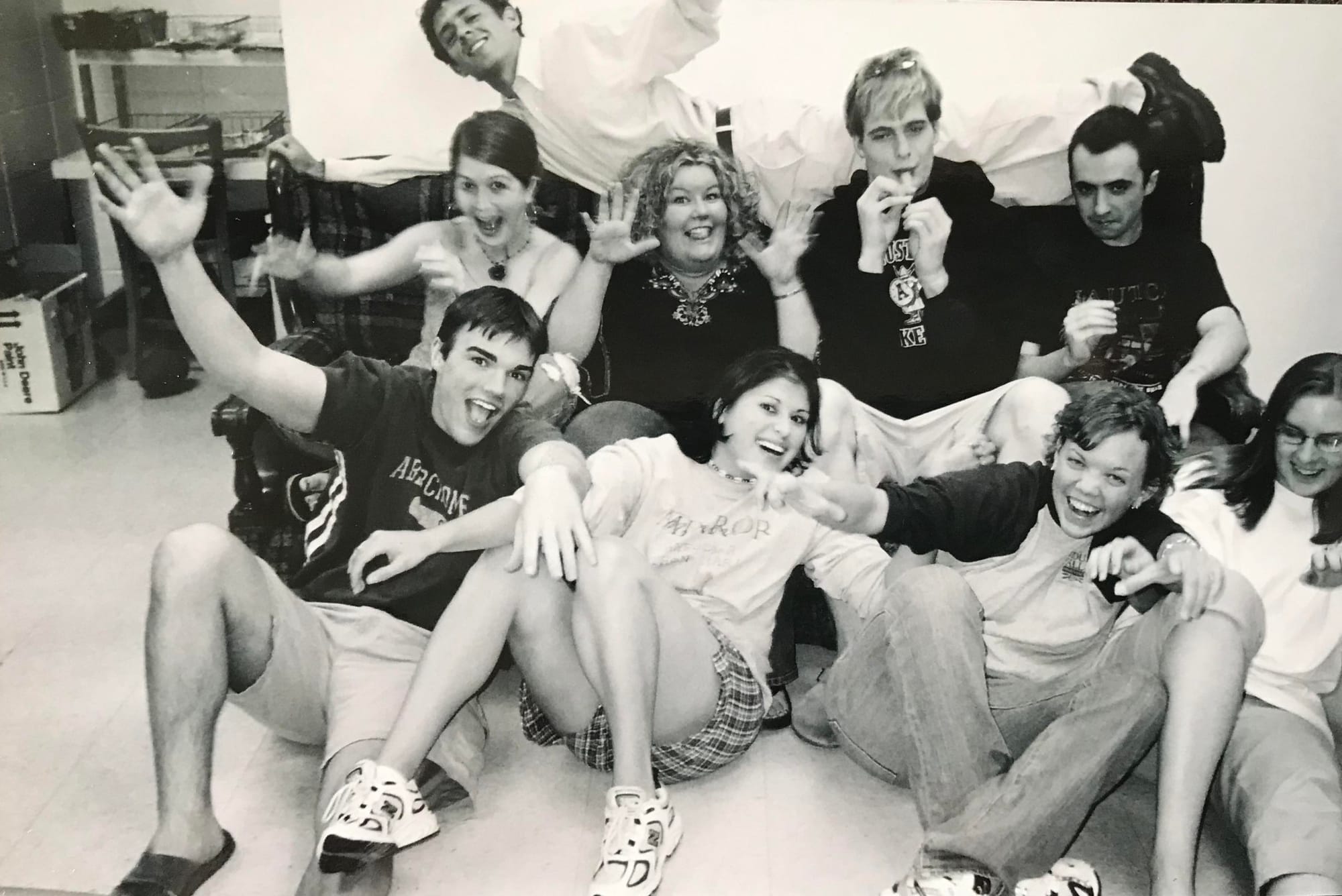
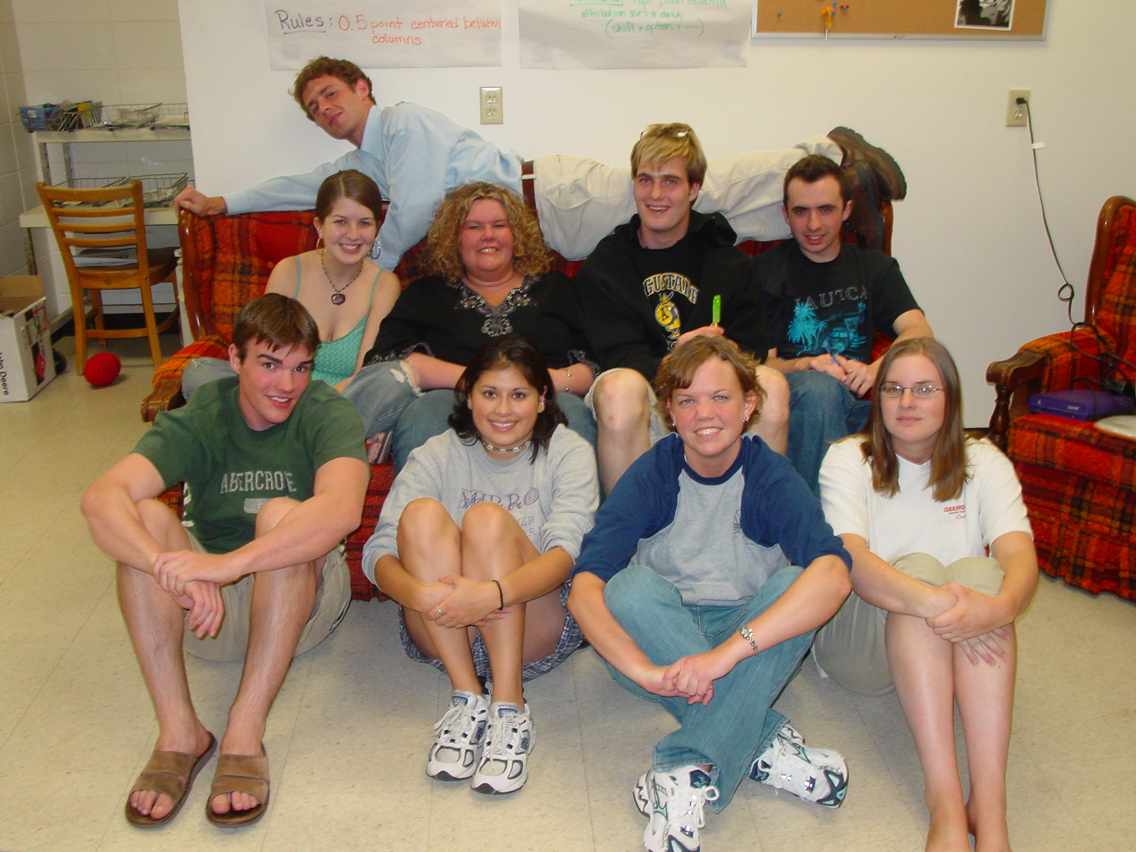
(Left) Marcella Prokop pretends to eat a fellow Mirror staffer's earring. (Center) Marcella Prokop, second from left front, poses for a silly photo with Mirror reporters. (Right) Marcella Prokop, second from left front, sits in a group of Mirror staffers. Photos submitted by Marcella Prokop.
Do you have a favorite story you wrote?
In high school and college, people called me Mars, and so my column was called “The View from Mars.” One year during Lent, I wrote about giving up the “F” word for Lent, so that was fun to write — totally irreverent, but it really did explore the struggle of giving up something that is such a part of your life.
Why does student journalism continue to be important?
I think student journalism publications are so valuable because they teach students real world skills. In my experience, I didn't end up going on to a newsroom, but I have had success in every job I've been in simply because Augustana trained me how to ask questions, how to listen, how to write, how to convey that information so that others could understand it and use it in the ways that they needed to use it.
What are you up to now?
I have been an adjunct at Augie off and on since 2012, so sometimes I'm teaching literature classes here. I am the director of access and workforce opportunity at Southeast Tech.
I'm a PhD student [in English] at Old Dominion University in Norfolk, Virginia. And then my husband and I have a 10-acre hard cider apple orchard, and we're opening a hard cider cidery this year, and I'm on the fermentation minor committee here at Augie.
Megan Raposa, ‘15
Editor-in-chief 2013-2015
What were your roles on the Mirror?
I started writing as a freshman, and then as a sophomore, I was the forum editor, and then I was the main editor-in-chief for two years.
What were some of your favorite times with the Mirror?
I think it really felt like we were a newspaper. It didn't feel like playing pretend. We had to make tough decisions about coverage. There were nights when we cried together. There were nights much more often that we laughed together and had inside jokes and there were disagreements over how things should be covered or written or designed.
It was just so much growth for me personally, and I just don't know that I would even be in this industry if I didn't have that kind of training ground and ability to do the real thing.
Do you have a favorite story you wrote for the Mirror?
One of the most fun things we did every year was the April Fool's satire issue, the Smirror. And, I don't know that I could remember any of the specific stories we wrote, but I remember those nights. Your face would be sore from laughing so much. It was just so fun to put that together, and we just got to flex our creative muscles in such a goofy way.
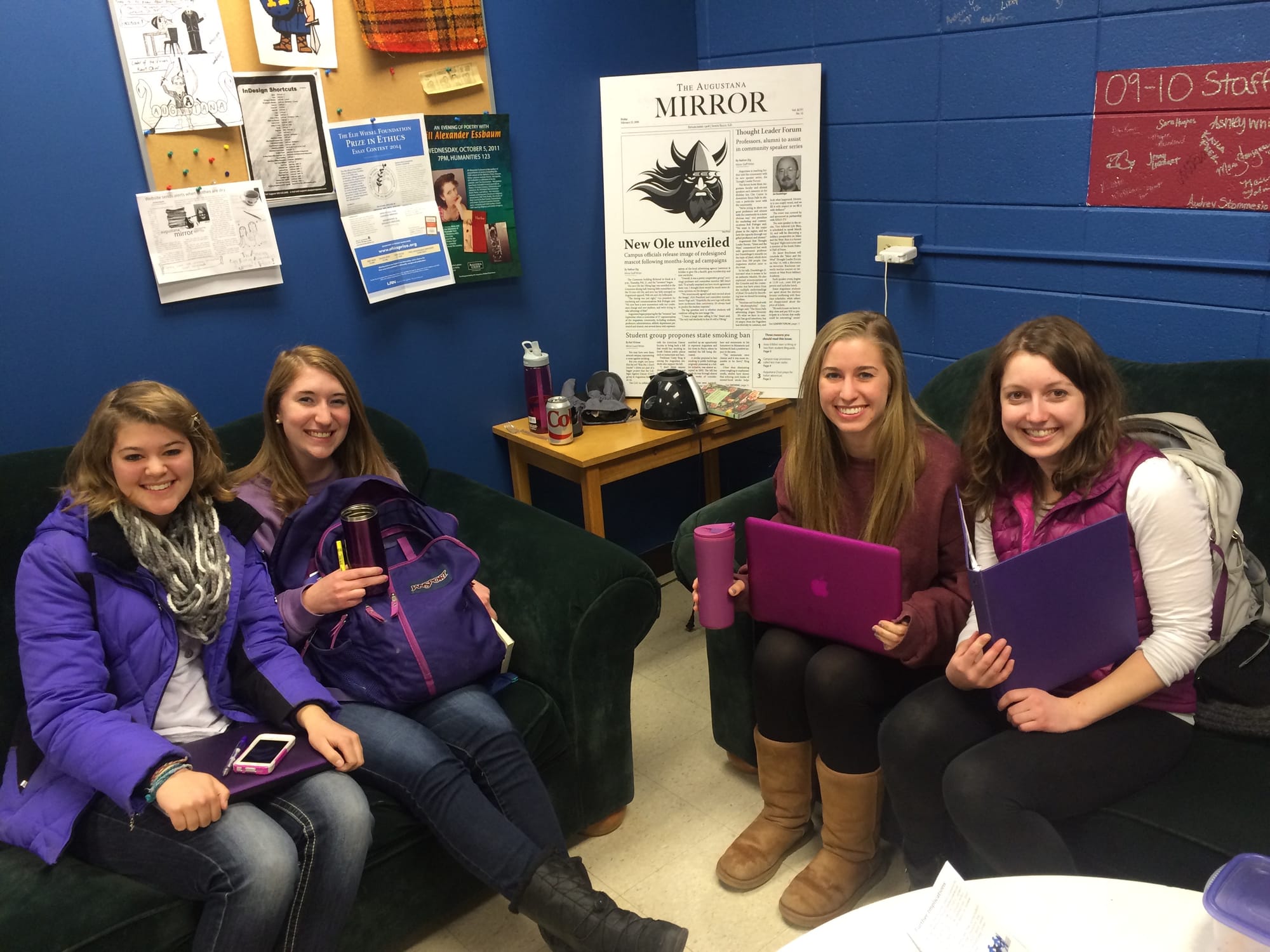
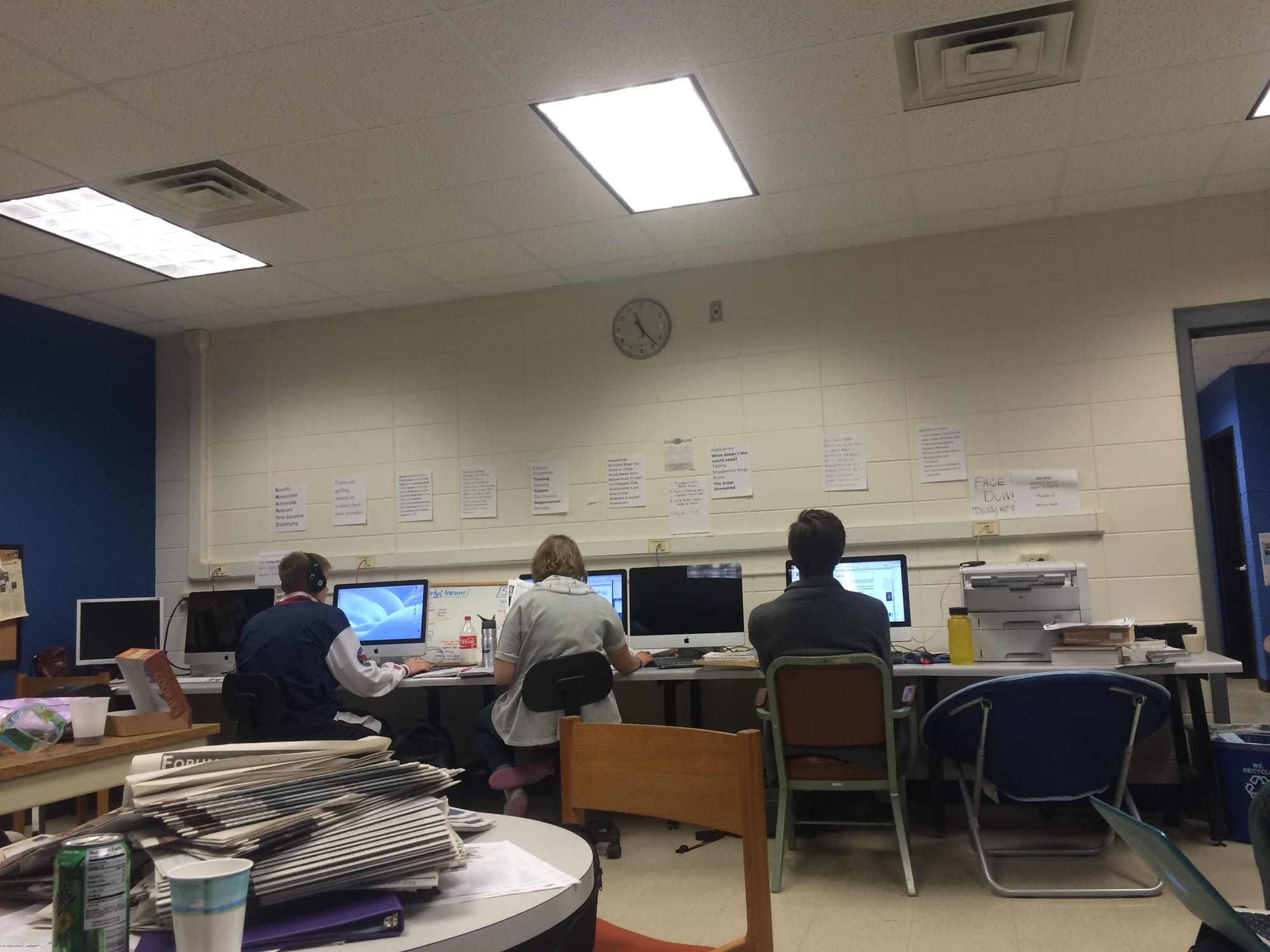
(Left) Megan Raposa, far right, sits on couches in the Mirror office with other reporters in spring 2015. (Right) Students work on computers in the Mirror office on a press night in 2015. Photos submitted by Megan Raposa.
How does it feel to have been a part of a 125-year publication?
I do firmly believe that journalism is the first draft of history. Being able to capture that draft of history from my brief time at Augustana in that big 125-year scope is incredibly meaningful to me and it feels important. I feel very grateful to have been a part of it.
What are you up to now?
I found journalism at Augie, and I never left it. I am now running my own independent local news outlet, Sioux Falls Simplified. It's a digital only, twice-weekly newsletter that's working to make it easy to feel smart about Sioux Falls. And it's fun because that touches Augie sometimes, and so I still have a vested interest in the Mirror and seeing it succeed because sometimes those stories can spill out into the broader community, too.
Noah Wicks, ‘21
Editor-in-chief 2020-2021
What roles did you have on the Mirror before becoming editor-in-chief?
I was sports editor for the two school years before that. [Freshman year] I was a contributing writer.
Do you have a favorite memory of your time on the Mirror?
I remember a lot of press nights where we were up late and everybody was really tired. We were all trying to put the newspaper together to get it printed the next day so it would come in on Friday. But we all had a really fun time up there — a lot of jokes, a lot of laughter, a very collaborative environment and I loved that.
Did you have any goals for the publication during the pandemic and your time as editor?
I was a history minor. We read about these periods in history where these major events are happening, and I think we all kind of collectively knew that this was one of those. So, one of the things I really wanted us to do as editor-in-chief was create articles that not only serve the student body now, but that can go into the archives and be a reflection, give future historians a glimpse of our day-to-day life, all of the events that happened during this pandemic, this life-changing event.
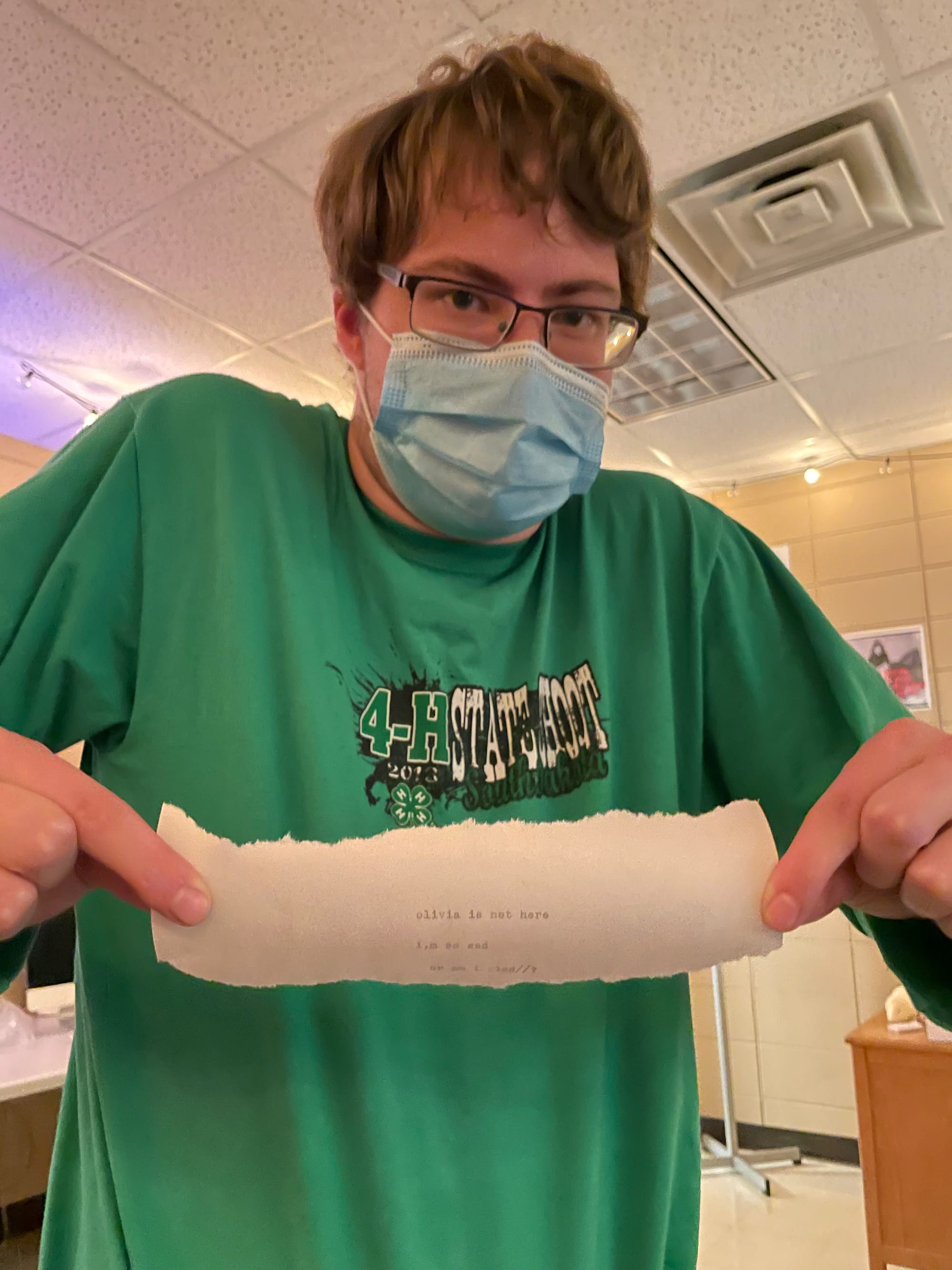
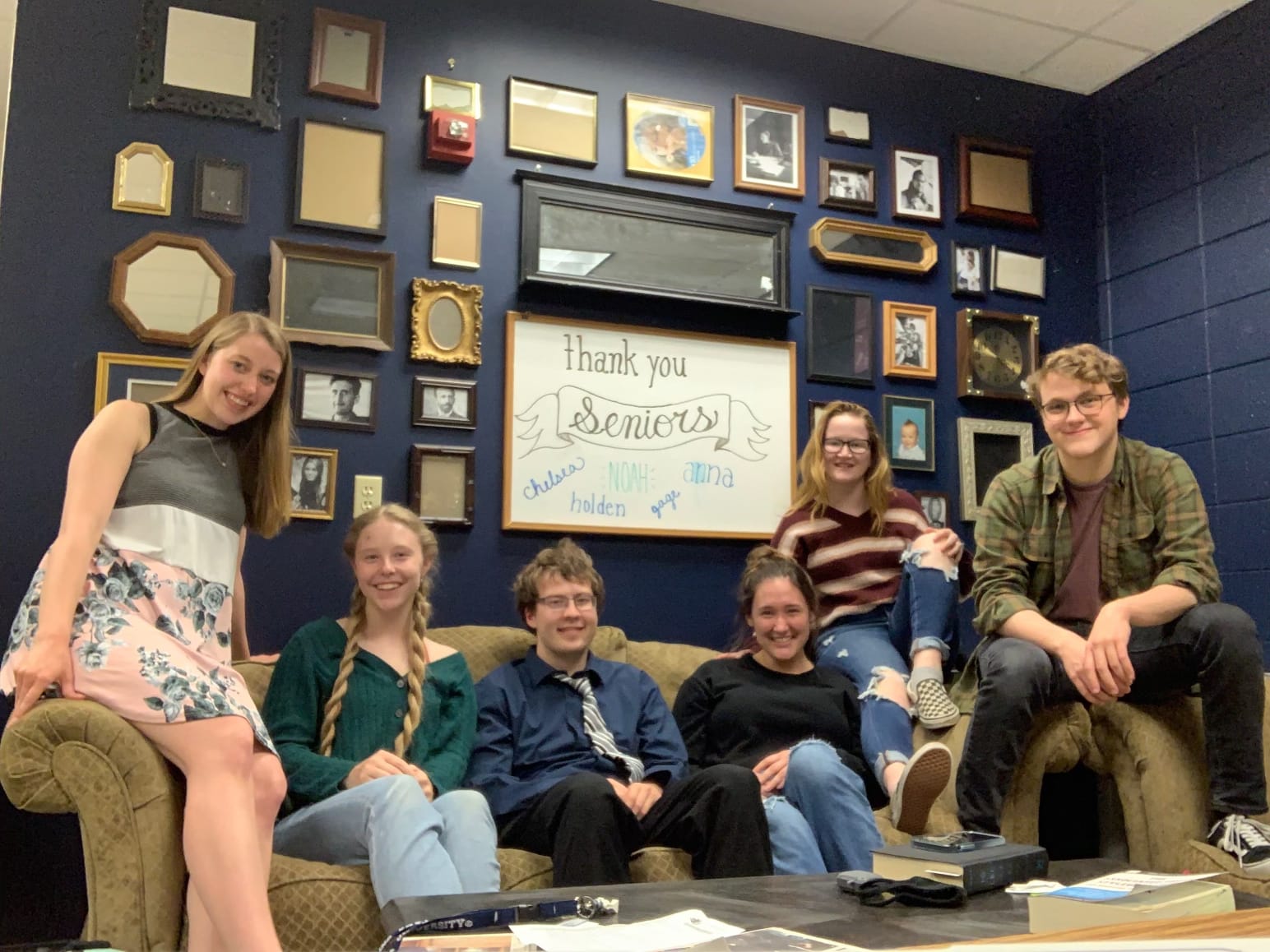
(Left) Noah Wicks holds up a poem he wrote on a type writer in the Nancy Dickinson Writing Center. (Right) Noah Wicks, third from left, sits in the Mirror office with staff in 2021. Photos submitted by Olivia Bertino.
What does it mean to you to be a part of a now 125-year-old publication?
It's incredible. Well, like I said, I was a history minor and I think it's really important and I think it's really cool to be a part of history and to help record history. I mean, someday, it heartens me to know that people may look at old Mirror copies to be like, “Wow, what did Augustana do during the pandemic?” Maybe it'll be part of a museum exhibit. I don't know. But, it's just really cool to be able to help write that first draft of history.
What are you up to now?
I currently work for an agricultural news outlet called AgriPulse, and they’re based in [Washington D.C.], but most of the time I work in South Dakota. And they've been very fortunate to let me work in South Dakota.
I report on agricultural — a lot of times — policy, but also other maybe non-government related issues sometimes, too. But, yeah, I love it. I get to talk to people and learn things every day. I mean, the other thing I like about journalism is it's just a job where you're learning, and then you just turn around and tell people what you learned, and I love learning. I love the constant ability to research different topics.



